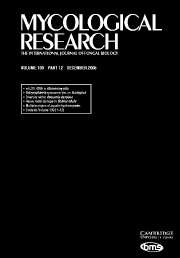Crossref Citations
This article has been cited by the following publications. This list is generated based on data provided by
Crossref.
Tibbett, Mark
Hartley, Maxine
and
Hartley, Stephen
2000.
Comparative growth of ectomycorrhizal basidiomycetes (Hebeloma spp.) on organic and inorganic nitrogen.
Journal of Basic Microbiology,
Vol. 40,
Issue. 5-6,
p.
393.
Robinson, Clare H.
2001.
Cold adaptation in Arctic and Antarctic fungi.
New Phytologist,
Vol. 151,
Issue. 2,
p.
341.
Erland, Susanne
and
Taylor, Andy F. S.
2002.
Mycorrhizal Ecology.
Vol. 157,
Issue. ,
p.
163.
Read, D. J.
and
Perez‐Moreno, J.
2003.
Mycorrhizas and nutrient cycling in ecosystems – a journey towards relevance?.
New Phytologist,
Vol. 157,
Issue. 3,
p.
475.
Read, David J
Leake, Jonathan R
and
Perez-Moreno, Jesus
2004.
Mycorrhizal fungi as drivers of ecosystem processes in heathland and boreal forest biomes.
Canadian Journal of Botany,
Vol. 82,
Issue. 8,
p.
1243.
Hoffman, Brad
and
Breuil, Colette
2004.
Analysis of the distribution and regulation of three representative subtilase genes in sapstaining fungi.
Fungal Genetics and Biology,
Vol. 41,
Issue. 2,
p.
274.
Cairney, John
Lindahl, Bj”rn
and
Finlay, Roger
2005.
The Fungal Community.
Vol. 20050554,
Issue. ,
p.
331.
Leake, J. R.
Johnson, D.
Donnelly, D. P.
Boddy, L.
and
Read, D. J.
2005.
Biological Diversity and Function in Soils.
p.
216.
McLean, M.A.
Angilletta, M.J.
and
Williams, K.S.
2005.
If you can’t stand the heat, stay out of the city: Thermal reaction norms of chitinolytic fungi in an urban heat island.
Journal of Thermal Biology,
Vol. 30,
Issue. 5,
p.
384.
Kytöviita, Minna-Maarit
2005.
Asymmetric symbiont adaptation to Arctic conditions could explain why high Arctic plants are non-mycorrhizal.
FEMS Microbiology Ecology,
Vol. 53,
Issue. 1,
p.
27.
Tibbett, Mark
and
Cairney, John W.G.
2007.
The cooler side of mycorrhizas: their occurrence and functioning at low temperatures.
Canadian Journal of Botany,
Vol. 85,
Issue. 1,
p.
51.
Frisvad, Jens C.
2008.
Psychrophiles: from Biodiversity to Biotechnology.
p.
381.
Cullings, Ken
Ishkhanova, Galina
and
Henson, Joan
2008.
Defoliation effects on enzyme activities of the ectomycorrhizal fungus Suillus granulatus in a Pinus contorta (lodgepole pine) stand in Yellowstone National Park.
Oecologia,
Vol. 158,
Issue. 1,
p.
77.
Gobert, Anthony
and
Plassard, Claude
2008.
Mycorrhiza.
p.
209.
Montecchio, L
and
Scattolin, L
2010.
Mycorrhizal Biotechnology.
Chalot, Michel
and
Plassard, Claude
2011.
Ecological Aspects of Nitrogen Metabolism in Plants.
p.
69.
Burke, David J.
Smemo, Kurt A.
López-Gutiérrez, Juan C.
and
Hewins, Charlotte R.
2012.
Soil enzyme activity in an old-growth northern hardwood forest: Interactions between soil environment, ectomycorrhizal fungi and plant distribution.
Pedobiologia,
Vol. 55,
Issue. 6,
p.
357.
Wilkinson, Anna
Alexander, Ian
and
Johnson, David
2012.
Genotype identity determines productivity and CO2 efflux across a genotype-species gradient of ectomycorrhizal fungi.
Fungal Ecology,
Vol. 5,
Issue. 5,
p.
571.
Timling, Ina
and
Taylor, D. Lee
2012.
Peeking through a frosty window: molecular insights into the ecology of Arctic soil fungi.
Fungal Ecology,
Vol. 5,
Issue. 4,
p.
419.
Korhonen, Anna
Lehto, Tarja
and
Repo, Tapani
2013.
Frost hardiness of mycorrhizal (Hebeloma sp.) and non-mycorrhizal Scots pine roots.
Mycorrhiza,
Vol. 23,
Issue. 7,
p.
551.




